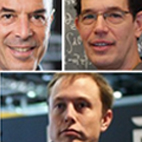Advancements & Achievements« Back to Advancements & Achievements Listings

HOW SOUTH AFRICANS ARE SHAPING THE FUTURE
By Rowan Philp, Chief International Correspondent for the Sunday Times (South Africa)
There is a reason why at least five South African expatriates are re-inventing the world’s future.
Sir David King, former Chief Science Advisor to Tony Blair and Gordon Brown, has midwifed the effort for cheap fusion energy and the largest tech experiment on the planet.
Dr. Neil Turok, Stephen Hawking’s chief collaborator and head of a major new physics institute in Canada, is leading research into quantum computing.
Elon Musk, creator of Tesla and SpaceX, is leading the electric car revolution and replacing the space shuttle with his cheap space bakkie.
Trevor Mundell, Head of Health for the Gates Foundation, is credited with eradicating polio and malaria from the face of the earth.
Finally, Dr. Ian Goldin, Director of Oxford’s 21st Century School, actually holds the one post entirely dedicated to finding solutions to the world’s greatest challenges, from governance to climate change.
There are dozens of other South African innovators punching far beyond their weight in cutting-edge industries, but these five actually lead fields wedded to the global future. Based on direct interviews and analysis by SABLE, a striking common feature emerges among them and applies to the potential edge emerging among ordinary South African entrepreneurs.
On a recent speaking tour in Malaysia, King said, ”There’s actually not much difference between the Model T Ford and cars coming out of factories today. What’s different are the new transportation devices now being developed that have not a single bolt on them—vehicles which can be entirely reprocessed at their end of their lives.”
Musk said he created SpaceX after realizing there was no difference (adjusted for inflation) between the cost of getting a payload to space in the computer age and doing the same in the 1960s (Musk also made the point that South African TV in the late ‘70s and ‘80s was “so bad” that it forced young innovators to read).
In addition to new methods for quantum computing research, Turok told me he launched a string of physics institutes in Africa, where students live with their lecturers 24/7, after noticing there was fundamentally “no difference” in modern post-graduate learning. And in his new, solution-based book, Divided Nations, Goldin—a former Vice President of World Bank—marvels at the fact that there is no difference in the way or the speed at which global institutions like the IMF, UN and World Bank operate, despite massive leaps in connectivity and the emergence of new powers.
Having grown up in a society without forces that entrench the status quo (i.e., the western world of lobbyists, health and safety regulations, and blue-chip swallow-up of emerging rival technologies), these expatriates were simply able to recognize lack of fundamental change and its disconnect with modern opportunities. They were able to call out the king as a man wearing no clothes and dress the peasants instead.
According to experts, the downsides to South African big thinking are “go-it-alone” development and isolated business planning. Veronica Motloutsi, IT Strategy Manager for Sun International, spent two months on an immersion fellowship with a pharmaceuticals start-up in Boston via a SABLE partner organization. The experience taught her that “we South Africans have big ideas, and then we build big things to show the West we can do it just as well—and then, too late, we find we have no market and no partners.” The fate of the Rooivalk helicopter, the Joule electric car and Eskom’s PBMR nuclear reactor echo Motloutsi’s point.
Instead, the networks she established in Boston have already revitalized her IT strategy for Sun International, with new platforms for online booking and gaming now in the works.
It’s no coincidence that the five field leaders are expatriates; the ingredients of mentorship and Western networking having been key to the influence of all five. But Turok identified a second South African trait—blunt candor—as another key feature of the pioneers. King said he took flak from UK government officials in 2004 when, as Tony Blair’s Chief Science Advisor, he criticized President George W. Bush for his “failure” to address global warming, adding that “Climate change is the most severe problem that we are facing today—more serious even than the threat of terrorism”.
He recently revealed that he was stunned by the “out-of-date” level of knowledge among senior UK officials and has since established an institute to bridge the gap between university knowledge and the knowledge held by policy makers.
“Right across government, you’ve got people educated on average 25 years before, so the solutions they’re delivering are up to 25 years out of date,” he told Malaysia’s Vantage Point TV program. “The state of knowledge in our universities is way ahead of where it is in our governments.”
As chairman of the working group for ITER—a project which, King says, can no longer use its full title of International Thermonuclear Experimental Reactor due to public alarm at the name—King had to convince numerous nations to fund an energy idea that has proven to be beyond the world’s engineering capability for decades. King admits he was somewhat sceptical himself, but he now says widespread fusion power stations are a real possibility. Using the process that powers the sun, the technology would power a human being’s lifetime energy needs with nothing but a single bath full of sea water and the amount of lithium found in a laptop battery while being virtually pollution-free. Construction of the giant tokamak reactor began in France this year, with first power expected by 2020.
When Mike Lazaridis, creator of BlackBerry, established a research center to take computing beyond the digital age, he sought out a South African to lead it.
The son of ANC MP Ben Turok, Neil Turok had already made a king-has-no-clothes breakthrough on the theory of the universe itself. He noticed that Hawking’s broadly accepted big bang inflation theory was in real trouble after two science satellites revealed the universe was almost exactly the same temperature everywhere you looked. Instead, Turok risked ridicule by founding the chief alternate theory, which says ours is simply the infant child of a dead parent universe. Data released by the Planck satellite in March 2013 suggests he could be right.
Using the same kind of revolutionary thinking and the same tool of powerful mathematics, Turok says the potential for vastly more powerful quantum computing would soon be a reality.
He also says that South Africans, and Africans in general, have an additional edge over Western peers in science and technology innovation. In rolling out his Next Einstein Initiative of 15 physics institutes around the continent, Turok insists that Africans are set to “do for modern science what Jewish students did in the last part of the 19th century when they were finally admitted to science and technology degrees in Europe. When new cultures and approaches are introduced to modern science, the impact is spectacular.”
Bio
Rowan Philp served as Chief Reporter and Foreign Correspondent for the Sunday Times in South Africa for most of the past decade—a period broken by stints at the Washington Post as Deputy News Editor; a Harvard/MIT fellowship; and two years as London Bureau Chief. Previously, he was based in Boston and served as the North American correspondent for the Sunday Times and Mail & Guardian, reporting on South African expatriates and diplomats, as well science and innovation. He isa currently chief reporter in South Africa for The Witness daily newspaper of KwaZulu-Natal and Media24.
In his 20-year career, Philp has reported from 27 countries around the world, from Haiti and Libya to the civil war in the Philippines and the World Economic Forum at Davos, as well as covering the past four US presidential elections. He has twice been awarded South Africa’s highest national print reporting prize, the Vodacom South African Journalist of the Year.

